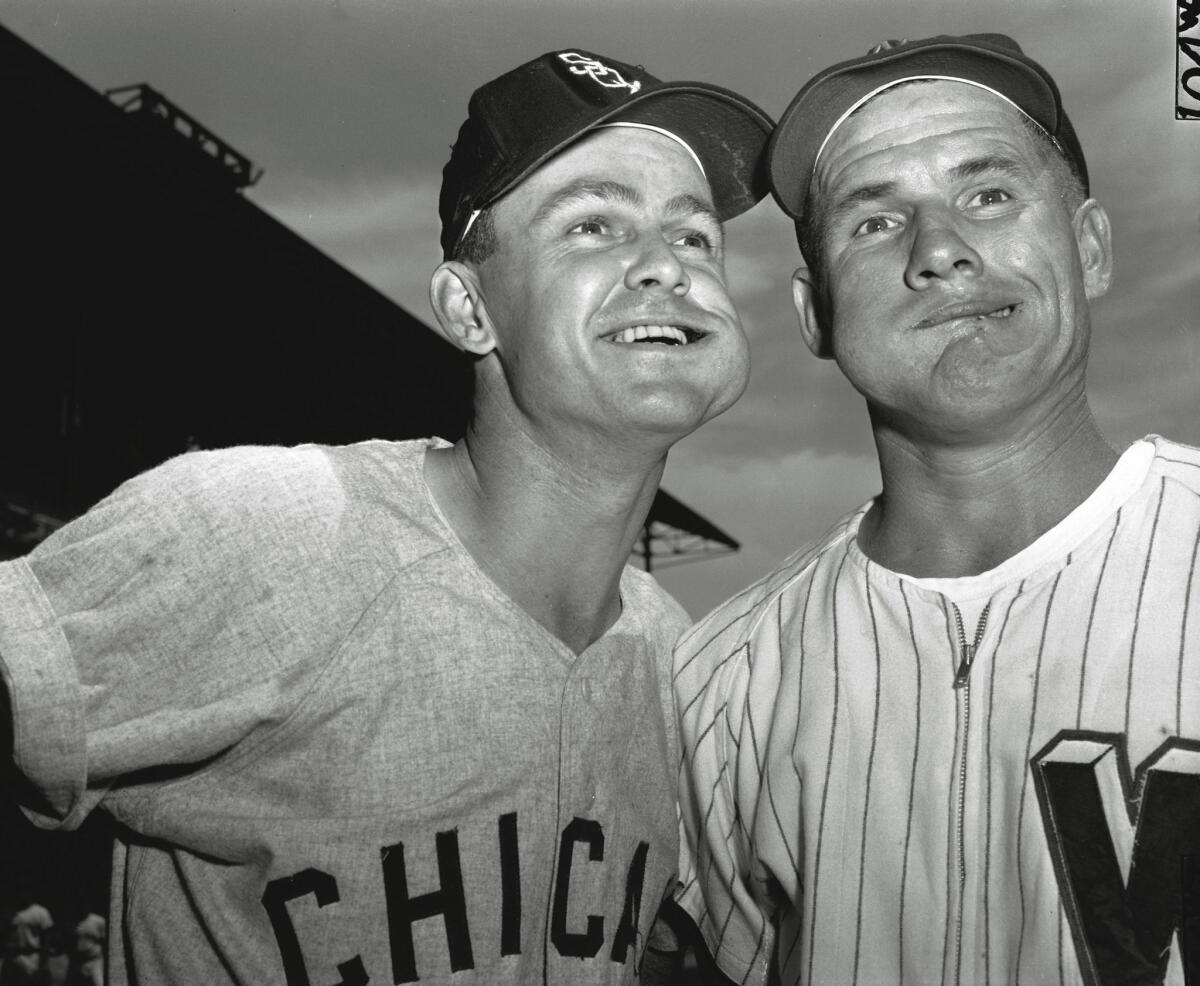Op-Ed: Chewing tobacco at ballparks is disgusting, but it shouldn’t be illegal

Chicago White Sox second baseman Nellie Fox, left, and Washington Senators shortstop Rocky Bridges pose with bulging wads of chewing tobacco in their cheeks before a game at Washington on Aug. 1, 1957.
I’m old enough to remember when the situational prohibition of legal tobacco products was seen as an unusual but necessary intervention to protect the health of serially exposed nonusers. It was a more innocent time, really.
When California first banned smoking in almost all bars and restaurants in 1998, we lonely objectors were seen as property rights fanatics and/or civil libertarian dead-enders, clinging to “slippery slope” arguments about the personal activities that emboldened lawmakers might prohibit next.
Well, that slope done slipped. Today, the Dodgers will play their first-ever home game without chewing tobacco, not because they finally realized it’s disgusting, but because it’s now, absurdly, illegal. Local politicians have served final notice that they recognize no restraints on their power to protect you from yourself.
The L.A. City Council, which approved the ordinance by a 14-0 vote in January, said in a statement upon passage that the ban was necessary, in part, to protect “the health of the players.”
Chewing tobacco smells bad, stains your teeth and will eat away at your lip and gums if you do it too much. It is also — importantly! — legal for adults, less harmful than cigarettes and even less compatible with daily life than smoking has become. (I suspect I wasn’t the only teenage ballplayer whose dipping days came to an abrupt and happy ending the moment it became remotely conceivable to kiss girls.)
For more than a century and a half, baseball players have used the leaf for its pleasant little buzz, and its diversion from the sport’s long stretches of pastoral boredom. Lawmakers are trying to break that culture by force, and the result is farcical.
If Clayton Kershaw, who deserves every dollar of his $1 million per start (at least during the regular season), were sighted in Chavez Ravine with some chaw in his cheek, the 28-year-old All-Star could be charged with an infraction and fined — the same punishment as someone found defecating in public.
The City Council says it wants “to set the right example for America’s youth.” I guess the lesson is: Don’t get too famous, or else your otherwise legal personal habits will become subject to the whims of attention-seeking politicians.
“Professional athletes” are to “protecting neighborhoods” what opera singers are to garbage collection.
As Councilman David Ryu explained: “Our kids shouldn’t be forced to watch the sports heroes they trust using tobacco. It’s important we hold professional athletes accountable when it comes to protecting our children and neighborhoods.”
But to paraphrase Bryce Harper, that’s a clown justification, bro. “Professional athletes” are to “protecting neighborhoods” what opera singers are to garbage collection.
And it apparently needs to be said that nobody on this earth is forcing little Johnny Shortstop to watch baseball on TV, let alone derive any positive life lessons from people who can handle 90-mph sliders. (Hey Johnny: Please don’t Google Lenny Dykstra.)
What makes the new ordinance even more nauseating than swallowing a gulp of Red Man runoff is the fact that the council members’ sanctimonious sense of public health extends only as far as their own bottom lines.
Consider this: Smoking in city parks has been illegal since 2007, because of concerns over secondhand smoke and brush fires, with the exception of dedicated areas at the Greek Theatre, the Los Angeles Zoo, the Autry National Center and a handful of municipal golf courses. Why did city-owned turf receive a get-out-of-smoking-ban-free card?
“There is a tradition of golfers oftentimes smoking in specific areas of a golf course,” Recreation and Parks Department official Kevin Regan explained persuasively to the City Council at the time, “and we don’t want to have any effects on our revenue.”
Imagine how the City Council would treat a private business owner who made the same argument.
Hypocrisy aside, let’s remember what we have already sacrificed. Not only did the slippery slope of restrictive paternalism slide effortlessly into prohibitions against everything from fast food joints in South L.A. to bacon-dog carts downtown, but smoking ban proponents have gone to lengths unimaginable as recently as the 1990s. Santa Monica came within a whisker of banning smoking in apartments. The federal Department of Housing and Urban Development is considering a smoking ban in all nationwide public housing units, a number that nears 1 million.
We are treating tobacco users like lepers, even when their activities pose no risk to bystanders. In the process, we are forgetting the difference between what the government can and should do. As the great Cubs Manager Joe Maddon, a former tobacco chewer, told reporters this month after Chicago followed L.A.’s lead (yet again!), “I’m not into over-legislating the human race.”
Maybe baseball professionals can teach us something after all.
Matt Welch is editor in chief of Reason and a contributing writer to Opinion.
Follow the Opinion section on Twitter @latimesopinion and Facebook
More to Read
A cure for the common opinion
Get thought-provoking perspectives with our weekly newsletter.
You may occasionally receive promotional content from the Los Angeles Times.










